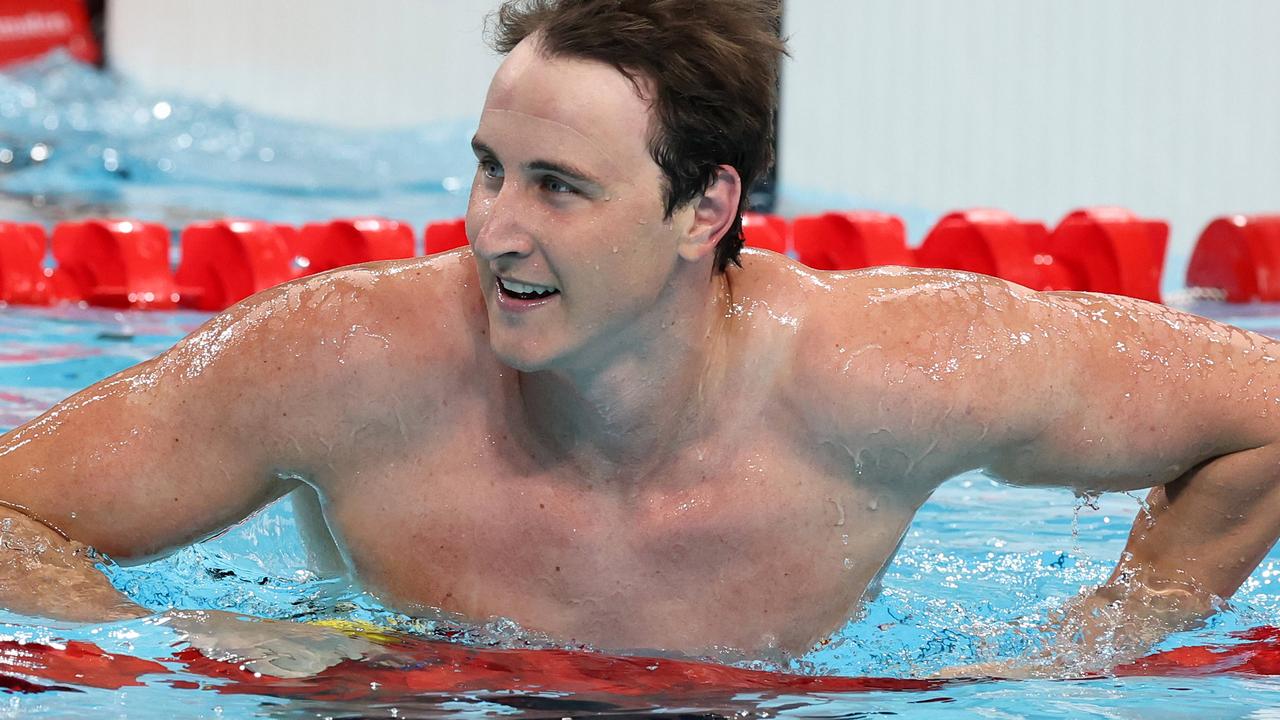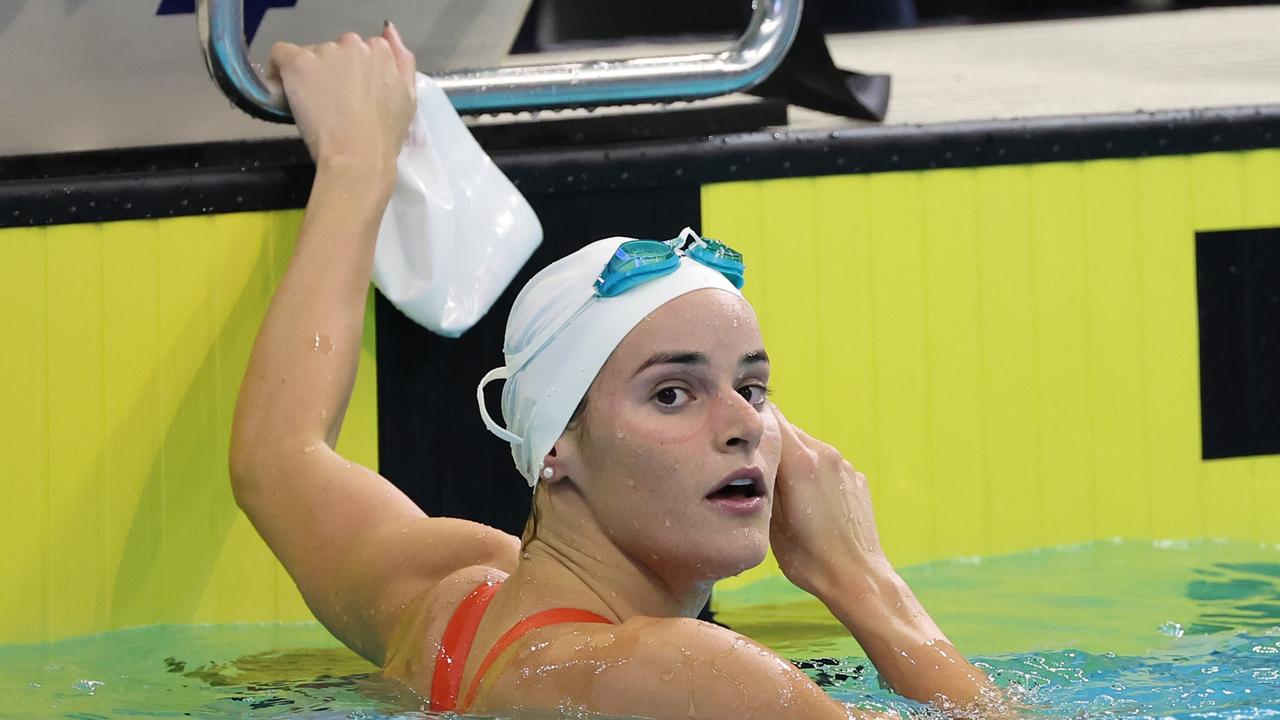Paris Olympics: Isaac Cooper wins gold after being robbed in 2022 as Aussie women break their duck
Australia’s Isaac Cooper has finally won his first individual world title after being cruelly denied by a technical malfunction in 2022.
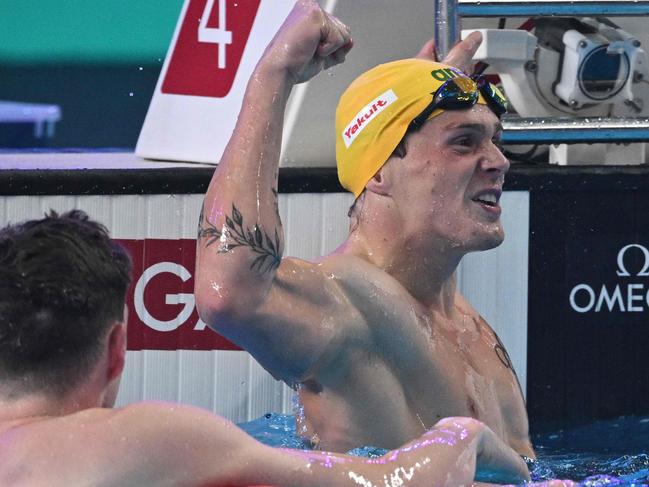
Swimming
Don't miss out on the headlines from Swimming. Followed categories will be added to My News.
More than a year later than it should have happened, rising Australian swim star Isaac Cooper has finally been presented with his first individual world title after helping the Dolphins secure third place on the medals table at the world championships in Doha.
Cooper, 20, won gold in the men’s 50 metres backstroke after holding off the defending champion, American Hunter Armstrong, in a tight finish, made even closer because the Australia twice hit the lane rope with his outstretched right arm.
For Cooper, the breakthrough win erased some of the lingering disappointment he felt after being robbed of gold at the 2022 short-course world championships in Melbourne.
A teenager at the time, Cooper finished first in the 50m backstroke final only to be told the result didn’t count because of a freak technical malfunction.
Although no-one actually broke early, the false start siren was sounded after the finalists left the blocks.
Only two of the eight finalists stopped swimming after hearing the alarm but that was enough for the red-faced officials to order a re-run an hour later.
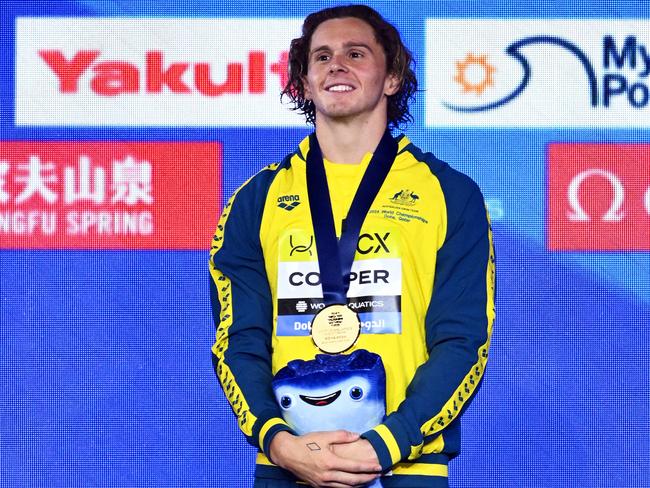
Cooper finished second in the rescheduled race and later burst into tears at the medal presentation, but he was all smiles after breaking through to win the long-course title on Monday morning in a slick time of 24.13.
One of Australia’s most versatile sprinters, Cooper has also made the final of the 50m freestyle at the last world championships so is hoping to swim both strokes at this year’s Paris Olympics.
“I am really proud of that swim,” Cooper said. “I have no idea what I am capable of but I think it’s up to the individual to test it.
“This event (50m backstroke) isn’t on the Olympic program so my goal is to now focus on 100m back and the 50m free.
“And now I know my front-end speed is there, I have to hold my speed and learn how to turn around and come back. But my focus is the 50m free.”
Saving the best until last, Australia’s women won their first gold medal of the championships when they took out the 4x100m medley relay.
With the United States opting not to enter the race and Australia missing most of their fastest swimmers who skipped the titles to stay home and train for Paris, Shayna Jack teamed up with Iona Anderson, Abbey Harkin and Brianna Throssell to win the final event of the eight-day program.
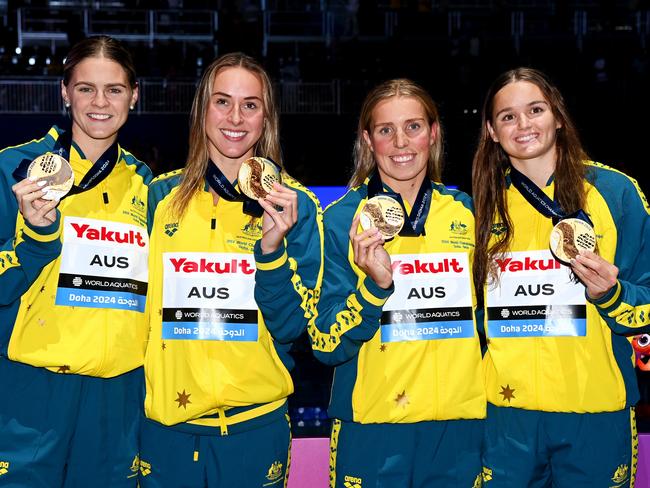
The understrength Australian team finished with 16 medals in the pool, comprising three gold, nine silver and four bronze, to end up third behind the Americans and Chinese. Sam Williamson won Australia’s other gold medal, earlier in the week, in men’s 50m breaststroke.
The Australian head coach Rohan Taylor was satisfied with the results but said there was a lot of hard work to be done before the Olympics.
“China and the US once again showed us the depth and quality they have,” Taylor said.
“Now we return home and get back into our domestic competition, and apply our learning for Paris, we’ll then come together again for a relay camp in April.”
The open water swim team also won a gold and silver in Doha while the divers won a combined three gold, two silver and a bronze.
Both the men’s and women’s water polo teams missed out on the medals but have already qualified for Paris and now know their opponents for Paris after the Olympic draw was made in Doha.
The Sharks are in Group B of the men’s tournament alongside Spain, Hungary, Serbia, Japan and France.
The Stingers are in the women’s Group A with the Netherlands, Hungary, Canada and China.
AUSSIE BEATEN BY A FINGER NAIL, RIVAL’S OLYMPIC BAN DEMAND
A disappointed Cam McEvoy remains buoyant about his chances of winning an elusive first Olympic gold medal in Paris later this year after a fingernail separated him from becoming the first Australian male in over a decade to successfully defend a world swimming title.
The raging favourite to retain the 50 metres freestyle final at the world championships in Qatar early on Sunday morning, McEvoy was denied by the narrowest margin in the sport – just one hundredth of a second.
McEvoy touched the wall in 21.45 seconds but in the fastest race in water, he was less than the blink of an eye behind Ukrainian speedster Vladyslav Bukhov, who claimed the gold in 21.44 then called for a blanket ban on Russian athletes competing at the Paris Olympics.
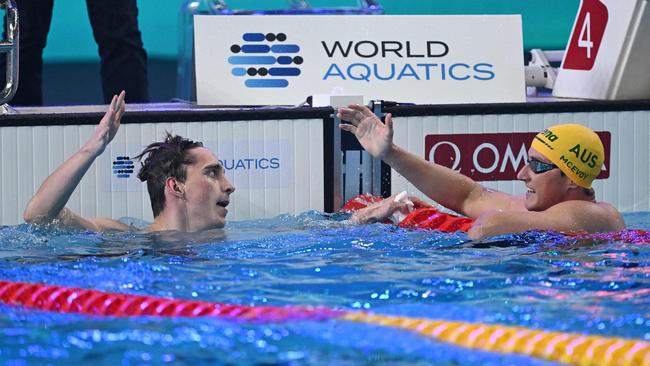
By finishing second, McEvoy just missed out on joining Ian Thorpe, Grant Hackett and James Magnussen as the only Aussie men to win back-to-back world titles in the pool.
Magnussen was the last man to achieve the rare feat when he won the 100m freestyle in 2011 and again in 2013.
“Of course, you want to get the gold medal. Even a tie for first would have been really nice,” McEvoy said.
“You always want to post good times so in that respect, I’m a little disappointed.”
McEvoy, 29, said he had mixed emotions about the result because his time in the final was slower than what he posted in the heats and semis and what he swam to win his first world title in Japan last year.
But he said he is still upbeat about his prospects for Paris in July and August because he knows he has the ability to go much quicker than his rivals.
“It is halfway through the Olympic preparation,” he said.
“This is all part of the process and to accumulate data ahead of Paris.”
Eight years younger than McEvoy, Bukhov is a star on the rise in freestyle sprinting who has been earmarked for bigger things since he won the junior world championship in 2019 and made the semi-finals at the Tokyo Olympics two years later when he was still just in his teens.
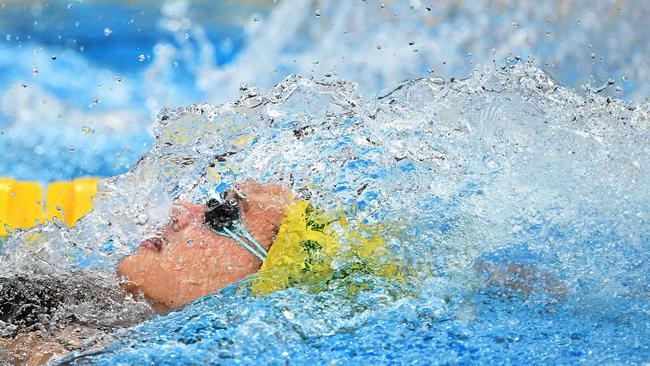
He became the first Ukrainian since 2007 to win a senior world swimming title and didn’t hesitate to use his platform to call for Russia’s exclusion from the Olympics for Vladimir Putin’s war on Ukraine.
“It’s really hard for us. We train while Russian rockets fly around swimming pools or other training buildings so you never know if you’ll be alive or dead,” Bukhov said.
“To be here and speak is very important for all Ukrainians.
“I want to say that Russia is dangerous and they’re not supposed to be in the competitions; they should be banned from Paris too.”
Russia and Belarus are both already blocked from sending teams to Paris but the International Olympic Committee has agreed to allow some athletes to compete as neutral individuals, as long as they meet strict criteria, which includes not being part of the military or showing any support for the war.
The Australian Olympic Committee is on record supporting the IOC’s stance.

The Australian swim team in Doha, which is missing a lot of its biggest stars who sat out the championships to continue their preparations for Paris, won three more silver medals early on Sunday morning.
As well as McEvoy, Queensland teenager Jaclyn Barclay finished second in the women’s 200m backstroke.
Then Hayley Lewis’ son Kai Taylor teamed up with Jack Cartwright, Shayna Jack and Brianna Throssell to win silver behind China in the mixed freestyle relay, an event which is included on the world championships program but not at the Olympics.
AUSSIE SWIM STARS DEALT TIMELY WARNING AS PARIS THREATS EMERGE
Australia’s world-beating swimmers have been given a stern reminder why they can’t count their chickens yet after the emergence of some seriously quick foreign rivals who are timing their runs to perfection ahead of this year’s Paris Olympics.
The Dolphins are still expected to win a swag of gold medals in the French capital but just how many remains to be seen because nothing is ever guaranteed in the cutthroat world of Olympic swimming.
The trick, as always, is peaking at the right time and Australia’s big rivals look like they have on course to hit their straps at Paris in July.
The Aussies were without question the dominant team at last year’s world championships in Japan, but the decision by most of the top swimmers to skip the current world titles in Doha has opened the door for their biggest international threats to lay down their own markers.
No-one gets Olympic medals for winning races five months before the main event but there have been enough hints this week to suggest the standard required to win in Paris is going to exceed anything that’s been seen before.
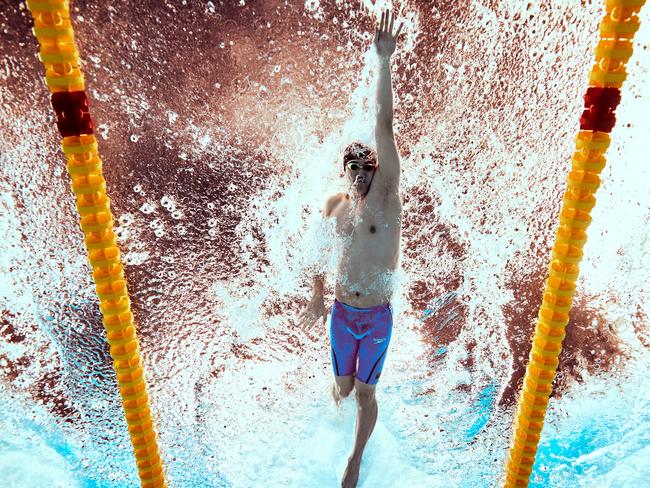
Australian sprint king Kyle Chalmers was given the clearest warning of the enormous mountain he has to climb when Chinese teenage sensation Pan Zhanle succeeded him as 100m freestyle world champion after breaking the world record for the men’s blue-riband event during the relay.
And now Australia’s female sprinters have put on high alert after rapidly-improving Dutch star Marrit Steenbergen and Hong Kong flyer Siobhan Haughey raised the bar in the women’s two-lap sprint.
While Australia looked to have a stranglehold on the event after Emma McKeon won the gold at the 2021 Tokyo Olympics and Mollie O’Callaghan took the highest honours at the last two world championships in Budapest (2022) and Fukuoka (2023), it’s suddenly game on.
Third at last year’s world titles, Steenbergen has slashed almost half a second off her lifetime best time just in the last eight months to become the fastest-ever Dutchwoman, sailing past Olympic champions Inge de Bruijn and Ranomi Kromowidjojo.
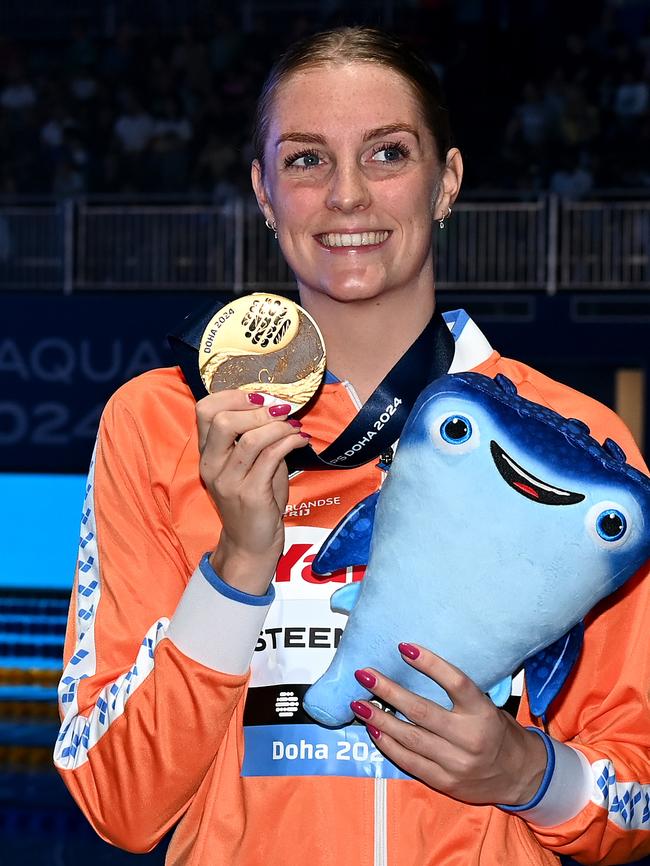
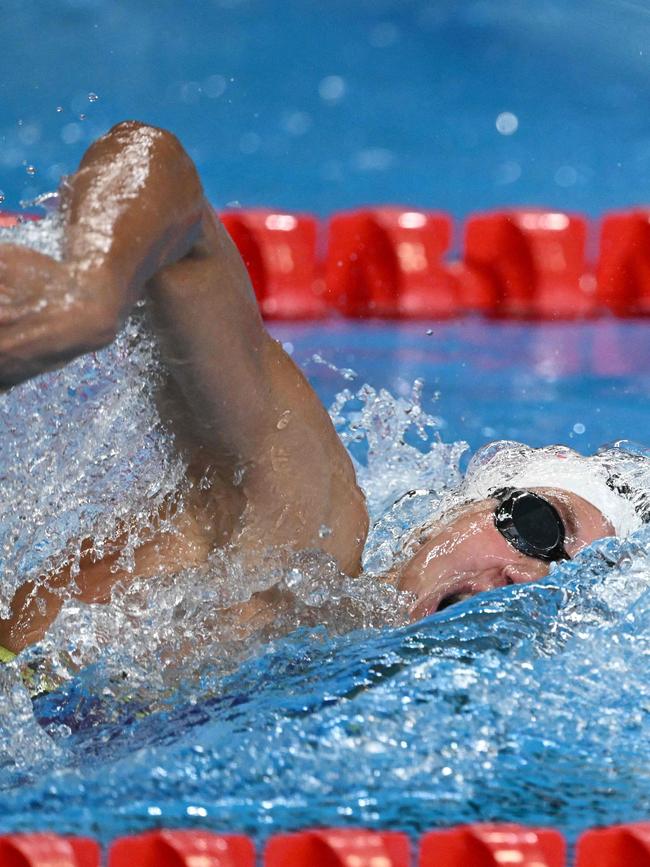
With more improvement likely to come, Steenbergen won the gold in Doha in a swift 52.26 seconds, with Haughey a close second and Australia’s Shayna Jack a commendable third.
Haughey – who was also runner up to McKeon in Tokyo and O’Callaghan in Fukuoka – won the 200m gold in Doha in the absence of her main Aussie rivals and also sits at the top of the current 100m world rankings, with the fastest time recorded since McKeon won the Olympic gold 2001.
The good news for Australia is that the Dolphins still occupy three of the top six spots, ensuring they remain odds-on to retain their 4x100m freestyle title in Paris regardless of what happens in the individual race.
The only reigning Australian world champion who made the trip to the Middle East is Cameron McEvoy.
He remains on course for confidence-boosting second successive crown in the men’s 50m freestyle.
The 29-year-old is a great believer in the notion that the best way to prepare for the intense pressure of the Olympics is by standing on the blocks and racing as quick and as often as possible.
And he’s done just that, setting the fastest qualifying time both in the heats and semis to go into Sunday morning’s final as the raging gold medal favourite.
Current women’s 100m world rankings
1. Siobhan Haughey (Hong Kong) 52.02
2. Mollie O’Callaghan (Australia) 52.08
3. Sarah Sjostrom (Sweden) 52.24
4. Marrit Steenbergen (Netherlands) 52.26
5. Shayna Jack (Australia) 52.28
6. Emma McKeon (Australia) 52.52
7. Kate Douglass (USA) 52.57
8. Abbey Weitzeil (USA) 52.92
8. Torri Huske (USA) 52.92
10. Penny Oleksiak (Canada) 52.98
SWIM STAR’S SUCCESS OPENS DOOR TO OLYMPIC RIVALS
Emma Greenwood
Cameron McEvoy’s revolutionary approach to swimming training has been so successful his rivals have adopted the method before the Paris Olympics.
McEvoy will take the blocks in the 50m freestyle heats in Doha on Friday as the defending world champion but faces new challenges from those who have seen his success and are seeking to replicate it.
The 29-year-old notched the fourth-fastest time in history to win the 50m freestyle at the world championships in Fukuoka last year, after totally revamping his training program to include just over an hour a week in the pool.
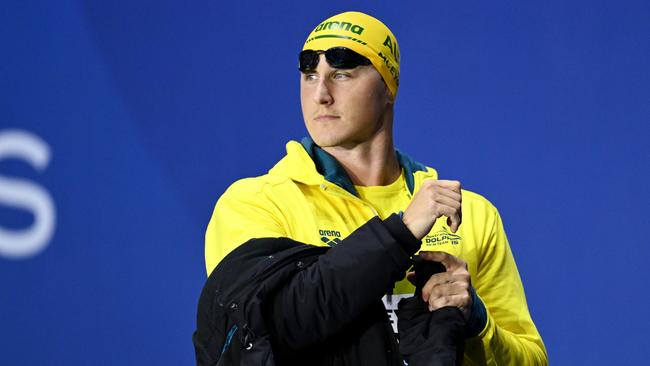
An emphasis on strength training and replicating sprint efforts at high intensity have paid off for the professor of the pool but his methods have been closely scrutinised by rivals, including former world champion Ben Proud.
“The new approach has basically sparked the sprinting world,” said McEvoy, who showed this week he was in great form with a personal best time in the 50m butterfly that netted him a world championship bronze medal.
“So they’ve moved towards what I’m doing.
“Ben Proud, for example, (he and his program) have changed everything since the worlds and he almost got a shortcourse world record (late last year) and he looked great in the water.”
McEvoy, who has a science degree majoring in physics, followed a gut feeling that there was no need for sprinters to spend so much time churning up and down the black line clocking up more than 50km a week in training.
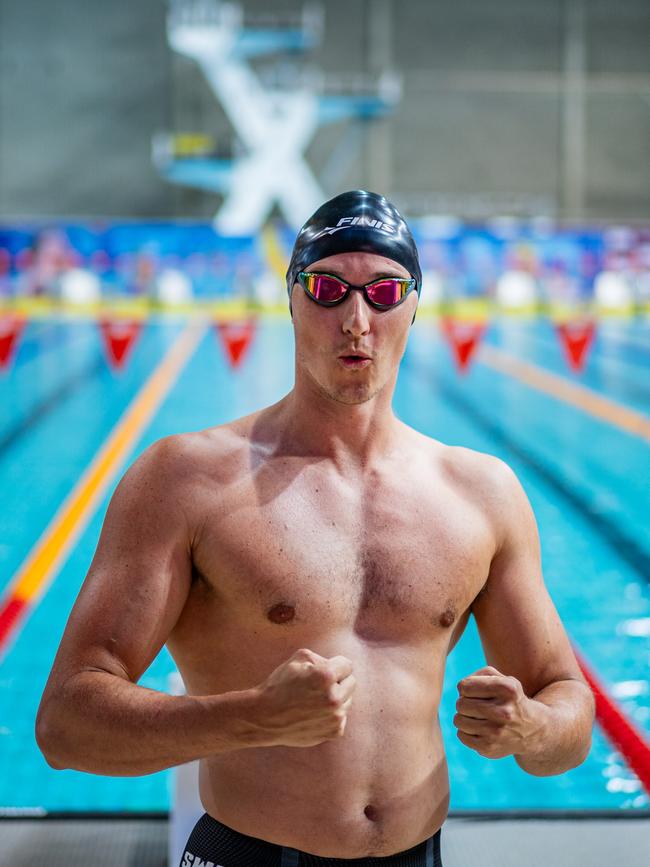
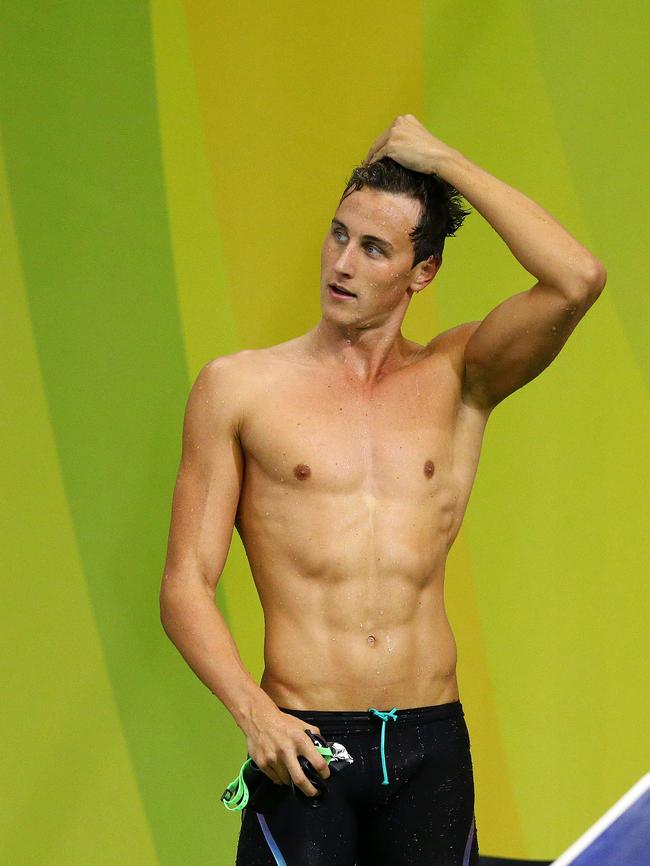
“It’s an approach that’s never been done before and so it was just almost like you’re in no man’s land hoping it works out,” he said of the initial steps into the new method.
“On paper it makes sense. In the theories from other sports, they do it, it works for them but it’s still an unknown (in swimming), so that was that was pretty tricky there.”
It’s certainly worked and McEvoy welcomes the attention that he has brought to an event he believes was being overlooked.
“Part of me is excited for where the sprint world can go now because I think the sport really needed a new approach to sprinting – it was deeply forgotten,” he said.
“But then on the other hand, it’s like, OK, now these guys are going to be much more efficient, they’re going to be ready to go in Paris and I think the depth there is going to be a lot stronger than it was in Fukuoka.”
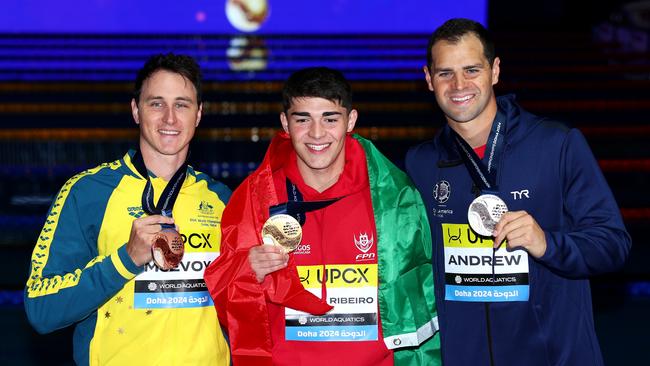
McEvoy realises that in sharing his techniques, he could be opening the door to his rivals.
His social media feeds are full of posts of his strength and swim training, while he’s just launched Instagram subscriptions to give fans knowledge and insight of his training on his journey towards a fourth Olympic team.
“I haven’t gone out and been like, this is what I do, XYZ,” McEvoy said.
“I’ve generalised it and then they’ve just gone, ‘what would that look like if we did that?’
“But post-Paris, I do want to get as much of the info out there (as I can) because not only just at the top of the sport, where I think the depth of the world swimming the 50m is going to be faster, but the amount of high schoolers, college kids coming up that just fall out of sport because they’re doing three or four marathons a week in training and they don’t want to and they’re getting worse doing it.”
A relay swimmer in the 4x100m and 4x200m freestyle relays at the London Olympics as a teen, McEvoy then headed into Rio as the favourite for the 100m freestyle as the fastest man in history in a textile suit but failed to find his best in 2016 as Kyle Chalmers bolted to gold.
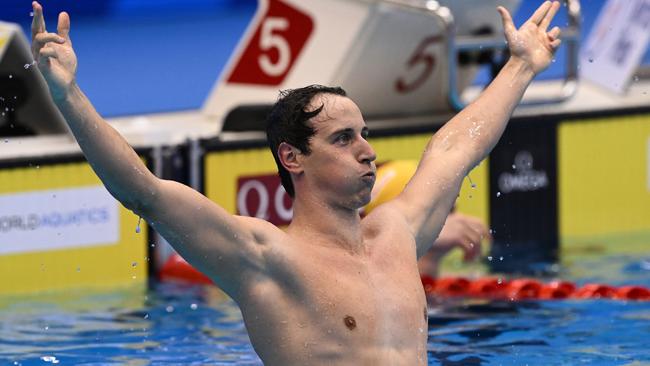
Many expected the Tokyo Games, where he won a medal as a relay swimmer, to be his swan song but such has been his revival that McEvoy could push on to Brisbane in 2032.
Already, though, McEvoy is back enjoying swimming and reinventing the approach to the sport for many.
“Within nine months, I went from not enjoying the sport at all for several years, having a pretty bad relationship with it and feeling like I was very much at the back door of my career to being world champ, hitting PBs again, brushing up against the world record again,” he said.
“With how much effort and struggle I put in over the seven years prior to that, it was almost like the effort was inversely proportional with the result.
“It’s significantly extended the longevity of my career.
“I’m 29 now … I’ll be 38 in Brisbane 2032 and so I’m just thinking I could be halfway through my career right now.
“It’s crazy.”
More Coverage
Originally published as Paris Olympics: Isaac Cooper wins gold after being robbed in 2022 as Aussie women break their duck




